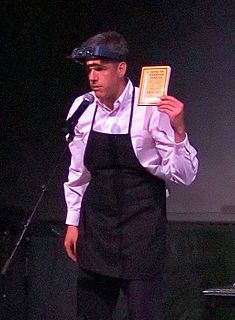A Quote by apl.de.ap
I'm good at shapes. If I'm not close, even if it's big, I can't read it.
Related Quotes
The truth is few people “think” big and even fewer “play” big. Why? Because “big” often means big responsibilitie s, big hassles and big problems. They look at that “bigness” and shrink. They’re smaller than their problems. They back away from challenges. Ironically, they back themselves into the biggest problem of all ... being broke, or close to it.
I read a lot, I always read. I like to be inside a story. When I started acting, even in high school, it sort of felt like that's as close as you can get to being inside a book, and I feel that way even with movies more so, because you've kind of created this imaginary world, and everybody is colluding to create it.
I hate the way you talk to me, and the way you cut your hair. I hate the way you drive my car. I hate it when you stare. I hate your big dumb combat boots, and the way you read my mind. I hate you so much it makes me sick; it even makes me rhyme. I hate it, I hate the way you're always right. I hate it when you lie. I hate it when you make me laugh, even worse when you make me cry. I hate it when you're not around, and the fact that you didn't call. But mostly I hate the way I don't hate you. Not even close, not even a little bit, not even at all.
Abstraction didn't have to be limited to a kind of rectilinear geometry or even a simple curve geometry. It could have a geometry that had a narrative impact. In other words, you could tell a story with the shapes. It wouldn't be a literal story, but the shapes and the interaction of the shapes and colors would give you a narrative sense. You could have a sense of an abstract piece flowing along and being part of an action or activity. That sort of turned me on.



































